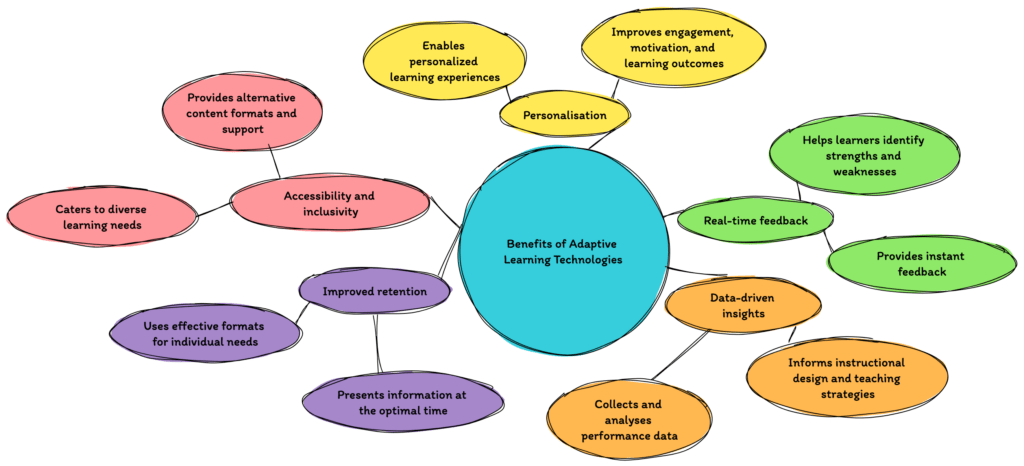Adaptive learning technologies have the potential to revolutionise the educational landscape by shifting from the conventional one-size-fits-all model to a more tailored, learner-centric approach. Using data and algorithms, these technologies customise educational content to meet each student’s unique needs, preferences, and abilities. This article will explore the benefits and challenges of implementing adaptive learning technologies and their capacity to enhance personalised educational experiences. For those interested in a more in-depth exploration of technology-enhanced learning, we recommend visiting the Open University’s research page on the subject: https://www.open.ac.uk/research/main/technology-enhanced-learning
What are Adaptive Learning Technologies?
Adaptive learning technologies are software tools and systems that use data and algorithms to tailor educational content to each learner’s needs, preferences, and abilities. These technologies can dynamically adjust the pace, difficulty, and content of learning materials to optimise the learning process for each student, creating a personalised learning experience.
Benefits of Adaptive Learning Technologies
- Personalisation: Adaptive learning technologies enable educators to deliver personalised learning experiences that cater to each learner’s unique needs and abilities. This personalisation can improve learner engagement, motivation, and overall learning outcomes.
- Real-time feedback: Adaptive learning systems provide real-time feedback to learners, allowing them to understand their strengths and weaknesses better and focus on areas for improvement.
- Data-driven insights: By collecting and analysing data on learner performance and engagement, adaptive learning technologies provide valuable insights that can inform instructional design, curriculum development, and teaching strategies.
- Improved retention: Adaptive learning technologies can help learners better retain information by presenting it at the optimal time and in the most effective format for each individual.
- Accessibility and inclusivity: Adaptive learning technologies can cater to diverse learning needs, including learners with disabilities or learning difficulties, by providing alternative content formats and personalised support.

Challenges of Implementing Adaptive Learning Technologies
Implementing adaptive learning technologies in educational settings presents several challenges that institutions must navigate. High costs can be prohibitive, especially for smaller schools with limited budgets. Data privacy and security are major concerns, as these systems collect and analyse extensive personal information. Resistance to change from educators and learners accustomed to traditional methods can impede adoption, necessitating significant time, training, and support. Integrating adaptive technologies with existing learning management systems (LMS) and educational tools can be complex and time-consuming. Additionally, ensuring that the adaptive learning content is of high quality and aligned with curriculum standards is pivotal but challenging, given the diverse needs of learners and subject areas.
- Cost: Developing and implementing adaptive learning technologies can be expensive, particularly for smaller educational institutions with limited budgets.
- Data privacy and security: Adaptive learning systems rely on collecting and analysing large amounts of data, raising concerns about privacy and security. Ensuring personal information is securely stored and used responsibly is a significant challenge.
- Resistance to change: Implementing new technologies can be met with resistance from educators and learners accustomed to traditional teaching methods. Overcoming this resistance may require time, training, and support.
- Integration with existing systems: Integrating adaptive learning technologies with existing LMS platforms and other educational tools can be complex and time-consuming.
- Ensuring quality: Ensuring that adaptive learning content is high quality and aligned with curriculum standards is essential but can be challenging, particularly when dealing with a wide range of learners and subject areas.
How Adaptive Learning Technologies Enhance Personalised Education Experiences
Adaptive learning technologies significantly advance educational methodologies, shifting from traditional, uniform teaching models to more personalised, student-focused approaches. These technologies utilise sophisticated algorithms and data analytics to tailor educational content to each learner’s strengths, weaknesses, and preferences. By dynamically adjusting the pace, difficulty, and nature of instructional materials, adaptive learning systems provide a customised learning experience that can significantly enhance student engagement and motivation. This blog post will explore how adaptive learning technologies contribute to personalised education by offering tailored instruction, real-time dynamic assessment, and continuous improvement in teaching strategies. We will discuss how these technologies can support greater learner engagement, improve educational outcomes, and support the continuous enhancement of curriculum and instruction methods. Through this exploration, we aim to highlight the transformative potential of adaptive learning technologies in creating more effective and inclusive educational environments.
- Tailored instruction: Adaptive learning technologies can identify each learner’s strengths, weaknesses, and learning preferences, enabling educators to provide tailored instruction that meets each student’s unique needs.
- Dynamic assessment: Adaptive assessment tools can adjust the difficulty and content of questions in real-time, providing a more accurate measure of a learner’s abilities and progress.
- Enhanced learner engagement: Personalised learning experiences can increase learner engagement. Students are more likely to be motivated and invested in their learning when relevant and tailored to their needs.
- Improved learning outcomes: Adaptive learning technologies can help learners overcome obstacles and achieve their full potential by providing personalised support and resources, leading to better learning outcomes.
- Continuous improvement: Adaptive learning technologies’ data-driven insights can help educators continuously refine and improve their teaching strategies and curriculum, leading to ongoing improvements in educational outcomes.
Conclusion
Adaptive learning technologies have the potential to transform the way we approach education, offering personalised learning experiences that cater to each learner’s unique needs and abilities. While there are challenges to overcome, such as cost, data privacy, and resistance to change, the benefits of adaptive learning technologies are significant. They can lead to improved learner engagement, retention, and learning outcomes.
To fully harness the power of adaptive learning technologies, TVET institutions must invest in developing and implementing these tools while addressing the challenges and ensuring the quality and effectiveness of the adaptive learning experiences provided. By embracing adaptive learning technologies, we can move towards a more inclusive, accessible, and personalised education system that empowers all learners to achieve their full potential.



